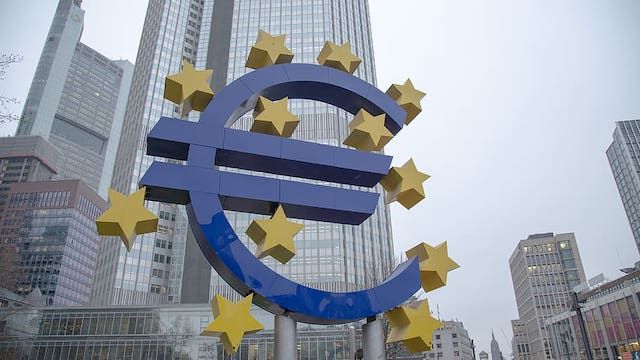The European Central Bank (ECB) decided to increase the pandemic emergency purchase programme (PEPP) by €600bn to a total of €1.3bn on 4 June.
It will extend it to at least June 2021 and reinvest all maturities until at least the end of 2022.
The ECB is also seeking to bring back inflation to the pre-covid-19 levels, as macro projections have been sharply revised downwards (2020: -8.7% and 2021: 5.2%) and downside risks prevail.
Expert Investor has gathered reactions from European investors on the ECB’s most recent quantitative easing (QE) plans in response to the covid-19 crisis.
Nicolas Forest, global head of fixed income at Candriam, commented:

“These measures were widely expected because, at the current pace, the ECB would have reached the limits of the current programme in September.
“Christine Lagarde nevertheless delivered more than expected and thus demonstrated a strong monetary commitment to support the liquidity of issuers. The non-financial credit market will be largely supported by these measures because these purchases will be able to absorb future issues and the net volume of issuance will be significantly negative at minus €200bn in 2020.
“Of course, the ECB is not solving all the problems linked to this exceptional recession, but it is giving time and significant support to governments and companies.”
Willem Verhagen, senior economist, multi-asset at NN Investment Partners, said:

“Since the outbreak of the crisis both the Fed and the ECB have concentrated their efforts on their role as lenders of last resort for the financial system and sovereigns. This role should be viewed as distinct from the conventional role of the central bank in setting the monetary policy stance with a view to achieve price stability.
“Over the past 10 years political constraints have often prevented the ECB from getting ahead of the risk curve. Our fear was that this might apply in relation to the PEPP as well, certainly after the German Federal Constitutional Court ruling. However, in June, the ECB clearly acted more aggressively and pre-emptively than many expected. This gives the ECB ample room to support asset classes and regions which suffer from a flight to quality.
“Also the ECB implicitly asserted its independence by not referring to the proportionality criterion at all. This is important because the German Constitutional Court raised doubts on the question whether or not the ECB’s regular QE programme started in 2015 was proportional with respect to the goal of price stability.
“Combined with the European Commission proposal for a recovery fund last week, this ECB statement signals that Europe is rising to the occasion and is formulating a substantial and credible fiscal and monetary policy mix to fight the fallout from the corona crisis.”
Martin Wolburg, senior economist at Generali Insurance Asset Management, said:

“The ECB is now rather ahead but not behind the curve. The extension of the PEPP beyond 2020 is furthermore very helpful as monetary policy stimulus support will not be reduced at the outset of 2021 when the European recovery fund is expected to kick-in.
“In a negative scenario, the ECB staff sees activity contracting by -12.6% in 2020 and recovering by only 3.3% in 2021, with an annual inflation of only 0.4% in 2021. We see today’s policy action also as partly insuring against the adverse scenario.
“The inclusion of additional asset classes into QE does not seem likely. Asked about the potential inclusion of junk bonds into the PEPP, Lagarde said that it was not discussed. Moreover, she referred to the fact that a large toolbox of policy instruments was currently in place, implying that there was no need for additional action.
“The ECB does not expect a clash due to the German Constitutional Court ruling: Lagarde emphasised that the ECB is subject to the Court of Justice of the European Union jurisdiction, which judged the PEPP as in line with the ECB’s policy mandate. She was ‘fully confident’ that a good solution will be found. It seems to us that the ECB is open to find a face-saving pragmatic solution on this issue.
“If the ECB’s base case materialises, the hurdles for further policy action seem high, albeit the easing bias was maintained in the policy statement. Put differently, only in case the downside scenario gains significant likelihood in the view of the Governing Council further action is likely to come.”
Reinhard Cluse, chief economist, Europe and Emea at UBS said:

“With today’s big package, we think the ECB has moved ‘ahead of the curve’, so that – in the absence of a serious escalation of the crisis – it might not have to take big policy decisions before late 2020.
“[Lagarde] presented the German Constitutional Court decision as mainly directed at the German government and parliament. This suggests to us, in line with earlier comments by ECB Governing Council member Isabel Schnabel, that the ECB will allow the Bundesbank to issue a report laying out the ‘proportionality’ of QE.
“However, we remain concerned that the PEPP might also be challenged before the German Constitutional Court.
“We doubt the €1.35trn PEPP envelope will last until mid-2021, but a further increase or extension might not be needed before Q4 2020.
“Consequently, unless the crisis escalates again, the ECB’s decisions over H2 2020 might be more of technical nature. Depending on market developments, it could include new asset classes into its purchase programmes (eg lower-rated corporate bonds or bank loans covered by government guarantees).
“A reduction to €4bn/day [of PEPP purchases] would be needed for it to last until June 2021. We expect the ECB to adjust the pace of purchases to the extent of market pressures, so as to exert a de facto ‘spread control’ policy.”







